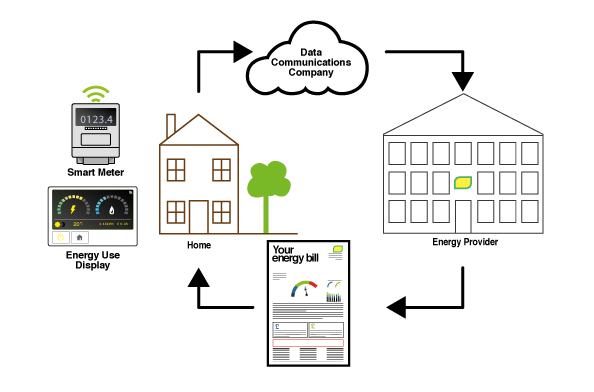We’ll say from the start we believe smart meters are a great idea. They can help home owners and businesses understand how and when they use energy – and how they can better manage their bills. In the UK there has been a concerted effort from the major energy providers to upgrade homes and businesses to the new meters. And while the pandemic did put the brakes on the national smart meter rollout for a while, it is now possible for you to book an appointment to change your old meter to a new unit.
At the heart of a smart meter is the data it creates of your energy usage, which your energy provider uses to calculate your bill. But what if the data from your smart meter could help you in other ways – could, for example, smart energy also deliver smart health? To answer this, let’s look at a few points in a little more detail. We’ll start with a simple look at energy smart meters.
How they work: Smart Meters

The diagram above shows a smart meter installed in a typical home. As energy is used, the smart meter records the amount and sends this information to the Data Communications Company, which in turn relays it to your energy provider who then calculates your bill. This automatic process makes billing more accurate than periodical meter readings.
To see what energy you are using at home from your smart meter, you can use a display unit which receives data from your smart meter every 30 minutes. One UK provider, SSE offers an In-Home Display unit which displays near real-time consumption and help to indicate ways to reduce energy usage. This can, for example, when the heating switches on the unit will show an increase in the amount of energy consumed. The homeowner can watch their usage and see possible ways to reduce their energy usage – for example, shorten the length of time the heating is on, thus reducing their bill. For businesses, SSE Business Energy offers an energy management platform called Clarity, which provides the data used in a series of reports.
So, a smart meter creates data to help make billing more accurate and helps you manage your energy usage. But could energy smart meters also deliver smarter health? The answer lies in the data they produce combined with the development of technology in caring for patients.
Patient Care And Technology
Monitoring patients and their health while at home takes time and resources. It has needed continuous visits from carers and manual updates of paper forms or specialist software applications. This has prompted the use of healthcare monitoring solutions – for example, movement sensors – which can help keep an active eye on the health and wellbeing of patients in their home. These solutions can improve both efficiency and quality of care, reducing the number of visits to patients who are doing well and directing resources to those in more need – and giving important alerts for those in critical need. But the use of this technology does have potential issues. For example, it can incur costs to install and use effectively, or integration into existing systems is problematic. Furthermore, some technologies such as wearable devices require the active participation of the patient – which they may forget to do or find uncomfortable or inconvenient.
This is where smart meters come in.
The data created by a smart meter could also be of value to care agencies too. As an example, a patient may have the heating on at a constant level to help with their recovery. By monitoring the data produced by the smart meter in the property, a care provider will be able to quickly see energy consumption levels and help to make adjustments if required. Similarly, if a property goes from a regular usage pattern to a constant flat rate, this can signal assistance being required.
It’s at this point that energy smart meters, combined with the power of Artificial Intelligence, could provide an additional (and beneficial) service layer to help care agencies look after patients.
Combining Smart Meters With Artificial Intelligence
As mentioned above, an energy smart meter creates data regarding usage. Over time, this forms into patterns that describe the daily routine of the patient; the time they get up each day, jumps in energy use that record when they eat, sleep, bathe, and so on. By processing this data via an Artificial Intelligence platform such as CareTech.AI, the service learns the patient’s patterns. This would allow it to alert that patient’s carer when their pattern deviates from the usual routine. Perhaps the most obvious example here is if AI spots no jump in energy usage first thing in the morning, which could indicate the patient needs checking to make sure nothing is wrong.
Can a smart meter help improve patient care?
The simple scenario above demonstrates how the use of a smart meter can provide additional data to a care provider or other agency, helping to focus services in a targeted manner that prioritises those in most need. Energy consumption and usage patterns could also be combined with other existing information derived from healthcare solutions to improve the landscape view of the patient and their wellbeing, and thus improving predictive analysis.
As you can see, the smart meter rollout can provide a real benefit to care agencies and housing associations who have vulnerable people renting within their estate. Housing Associations have been enthusiastic adopters of smart meters as they recognise the potential for them to save energy. But, we believe, they can work with other health technologies to deliver more efficient and effective patient care.
